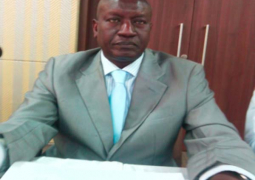A team of
The visit to The Gambia by the latest
APS is an international security cooperation initiative aimed at strengthening global maritime partnerships through training and collaborative activities, in order to improve maritime safety and security in
During its stay in the country, the vessel will host instructional courses for Gambian naval forces in the subjects of maritime intelligence, non-commissioned officer leadership, basic instructors training to be taught by instructors from U.S. Naval Forces. This will be followed by a two-week small-boat hull maintenance course to be taught at the Gambia Navy base.
Addressing the opening ceremony, Cynthia F. Gregg, charge d’affaires and deputy chief of mission at the US Embassy in Banjul, said The Gambia like many other countries is facing maritime threats from illegal fishing boats, narco trafficking and trafficking in persons.
According to the
“The
Noting that The Gambia has already developed what she called a very fine and professional relationship with the
Lt commander Charles E Eaton, officer in charge of the vessel, said the African Partnership Station is an international initiative geared towards building relationships that will improve maritime security.
“As APS enters its fourth year, maritime partners continue a mission that has grown to bring together 34 Africans, Europeans and South American countries,” he stated.
According to him, APS is motivated by the belief that effective maritime security and safety will contribute to the development, economic prosperity and security within
“We have seen great motivation and professionalism in the Gambian navy. We will continue to help the Gambian navy in training in order to ensure safety at sea,” he added.
Lt John Repik, team leader to The Gambia, expressed the hope that the training will help the Gambian navy.
“APS is a multilateral effort with 34 nations participating working together to build a more secure maritime security environment along the coast of
The Chief of Defense Staff of the Gambia Armed Forces, Lt. General Massaneh Kinteh, in his speech recalled the support that
“The African region like The Gambia requires constant maritime sea going naval assets, maritime legislation and institutions to better regulate the fishing industry, policing and prosecution of illegal acts,” Kinteh added.
Lt. General Kinteh also recalled that the overall goal of the APS programme series is to build skills, expertise and professionalism of African military forces, the coast guards and marines.
He stated that The Gambia is significantly challenged in enforcing the rule of law beyond its territorial waters to combat illegal fishing, human smuggling and drug trafficking.
Commodore Madani Senghore, Commander of the Gambia Navy said the training is mainly geared towards enhancing maritime security, and security through partnership.



